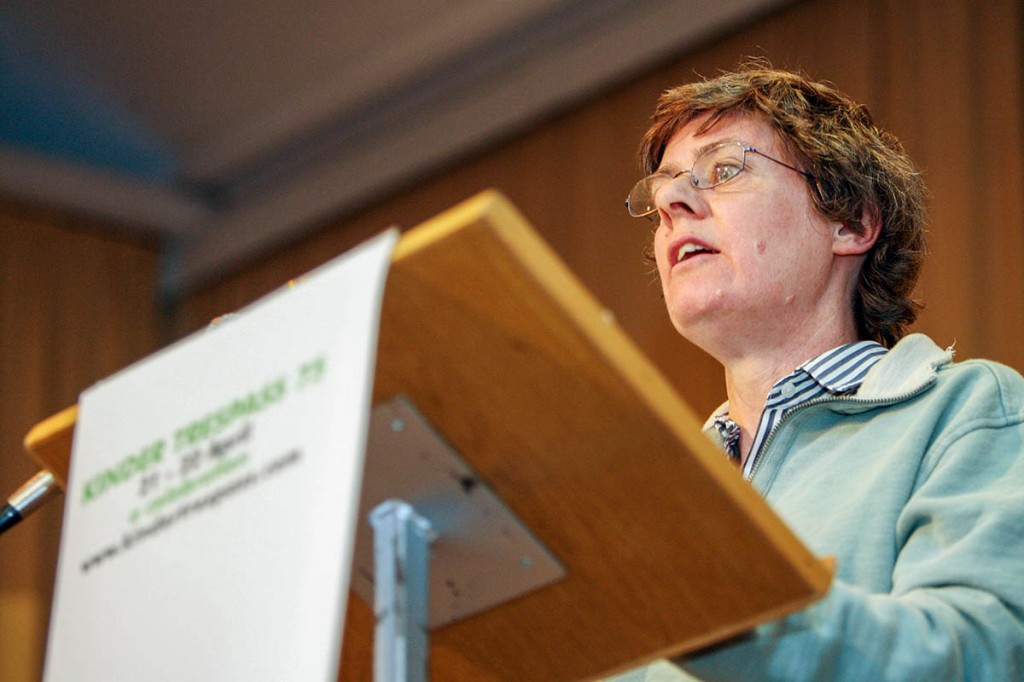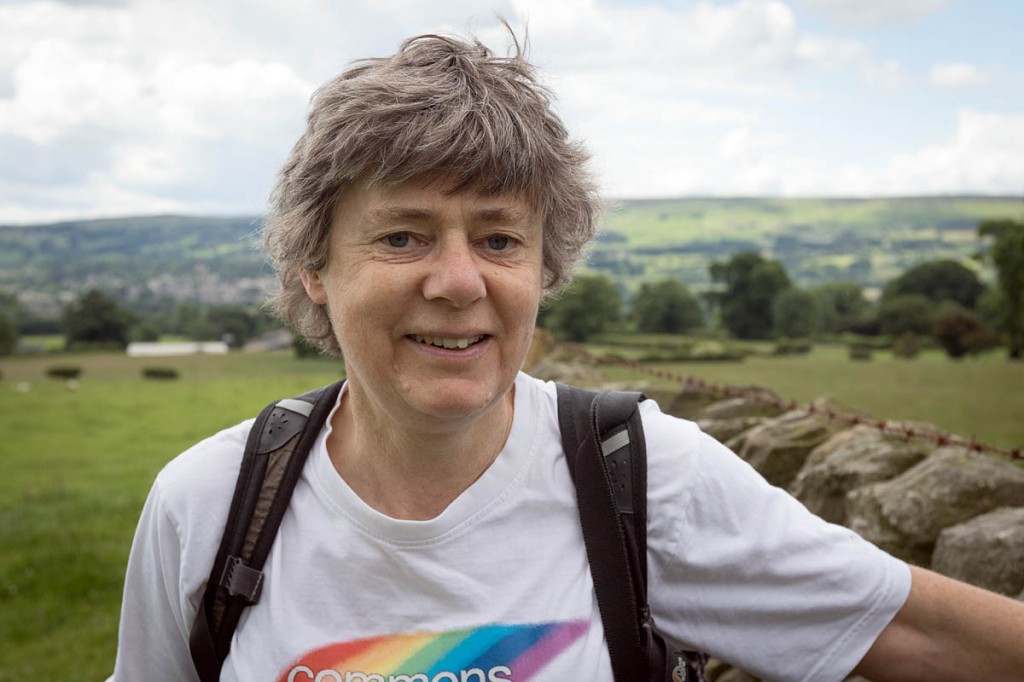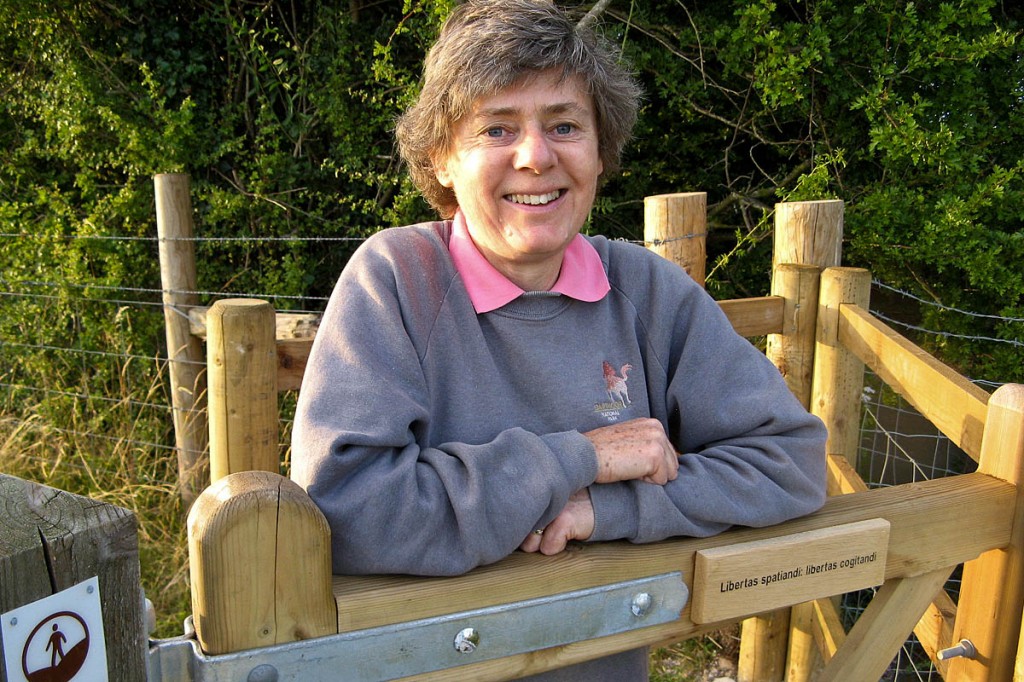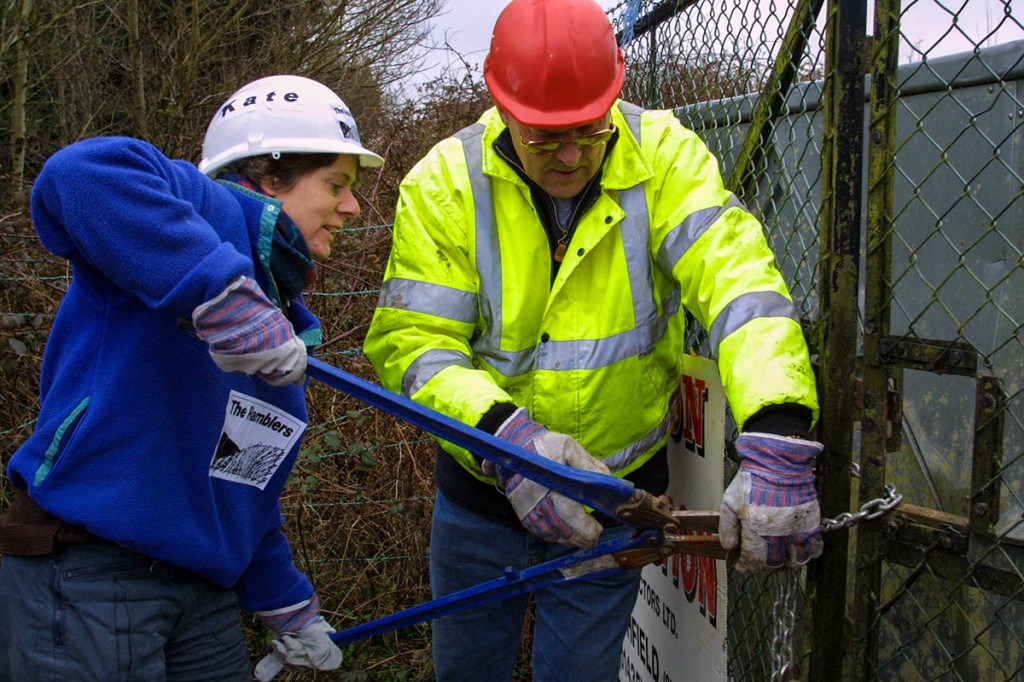A champion of public access has celebrated 40 years’ leadership of Britain’s oldest national conservation body.
Kate Ashbrook, general secretary of the Open Spaces Society, is the longest-serving chief executive officer among bodies dedicated to the amenities and freedom of the countryside.
Her four decades of campaigning have included work resulting in remarkable changes in the safeguarding of commons, greens, and public paths, the objects of the society’s care since it was founded in 1865.
Ms Ashbrook has in that time worked from the OSS’s office, an attic in Henley-on-Thames, with a staff of only nine, mostly part-time, and 45 volunteer local vigilantes spread around England and Wales.
She said: “I am proud of them all. We back them with training and advice; the law relating to commons, greens, open spaces, and public highways is complex and not easy to navigate.
“An email to the Henley office from any of our volunteers or other members always gets a swift and constructive response. Our volunteers know that when the chips are down the society is always ready to go to law, to the Supreme Court if need be.
“We now have a right of access to all registered commons, and many town and village greens are registered and protected against development as never before. That was not true when I took the job.
“Public paths do not yet have the protection they deserve. Too often they are closed or moved at the whim of landowners. And there are local authorities whose record in failing to keep these country lifelines open is disgraceful.
“Worse still the Westminster government is determined to abolish hundreds of miles of unrecorded, historic paths in less than seven years’ time.
“I foresee plenty of fighting ahead, and I hope to be in the thick of it.” She added: “Our record of legal victories is a distinguished one.”
Among highlights of Kate Ashbrook’s time at the Open Spaces Society are:
1984 Society was represented at public inquiry to oppose closure of 32 miles of public paths across the Larkhill artillery ranges in Wiltshire. National Trust abandons application for fencing on Quantock Commons in Somerset, which the society opposed, on discovering that it had no powers to permit works on commons unless they were for the enjoyment of the public.
1985 Victory against development on Copthorne Upper Common, West Sussex, and Portland Bill common, Dorset. Published Our Common Land, a comprehensive guide to the law and practice of common land and town and village greens.
1986 Common Land Forum report published – agreed solution to access on and management of common land, in which the society played a significant role. Parliament Piece, Kenilworth, given to the society. Dyfed County Council removes unlawful fencing on Plumstone Mountain Common following complaint by society. Victory against office development, Horsell Common, Woking, Surrey.
1987 Government promises legislation on common land based on Common Land Forum recommendations (but Country Landowners’ Association reneged from agreement). The society, with the Ramblers, publishes five-point plan to save Bodmin Moor, Cornwall. Walton Heath Golf Club’s plans for Walton Heath common, Surrey, thwarted.
1988 Launched campaign for community action on green spaces. Assisted by OSS interventions, commons commissioner rejected claim of ownership by sporting-right holders of Grassington Moor common, which would have put it at risk of deregistration. Parliamentary committee rejects Hampshire County Council’s private bill for the Lyndhurst bypass, which threatened part of the New Forest; the society gave evidence. Won improvements to Newcastle upon Tyne Town Moor Bill, and the Avon Light Transit Bill.
1989 Achieved amendments to Common Land (Rectification of Registers) Bill. Won a circular path on land owned by environment secretary Nicholas Ridley, at Kilnholme, Cumbria, by objecting to his proposal to extinguish the path to allow for development of his third home.
1990 Publicised opportunities to register new greens which were omitted from registration under Commons Registration Act 1965. Publicised beating the bounds of commons on Rogation Sunday. Persuaded Gwent County Council to charge a fee for path-change applications by landowners. Persuaded Northamptonshire County Council to amend its circular-walks leaflets which encouraged walkers to use unofficial diversions at behest of landowners. Protested against blocked footpath at Henley regatta by walking through marquee during Sunday lunch.
1991 Drafted a short bill on the protection of common land. Published Spaces Between, a booklet on protecting urban open space. Gained Countryside Commission support for a local authority briefing note on common land.
1992 Launched Making Space, a guide to protecting, improving, and creating open space, at Kenwood House with environment minister.
1993 Won amendments to the Malvern Hills Bill. Published report on the commons of Bodmin Moor, Cornwall, many of them illegally fenced.
1994 Persuaded National Trust to join in a ‘friendly’ court action to clarify the law on fencing its commons.
1995 Backed OSS local correspondent for Powys in successful prosecution for path obstruction at Churchstoke. Published first edition of Getting Greens Registered.
1996 Saved historic path through Sydmonton hamlet, Hampshire, from diversion away from house owned by Andrew Lloyd Webber, and riverside path at Oundle, Northamptonshire, from diversion by Oundle School.
1997 Helped MPs to defeat the Bodmin Moor Commons Bill which threatened public access on Bodmin Moor. Helped save Thwaite Common, Norfolk, from fencing, and Newcastle Town Moor from a football stadium. Defeated a path diversion at Manaccan, Cornwall, at a public inquiry, and won costs from Cornwall County Council. Ombersley path rationalisation scheme in Hereford and Worcester rejected following public inquiry, with costs awarded to society. Defeated path rationalisation scheme at Little Staughton, Bedfordshire. Won improvements to the Shrewsbury and Atcham Bill.
1998 Appealed successfully to high court to quash Canterbury City Council’s path diversion at Chatham, Kent. Helped to save Chobham Common in Surrey from fencing, and Barningham High Moor in County Durham from 25 wind turbines.

Kate Ashbrook speaks at a meeting to mark the 75th anniversary of the Kinder Scout mass trespass. Photo: Bob Smith Photography
2000 Celebrated the enactment of the Countryside and Rights of Way Act for which we had lobbied for decades. Won vital amendment to make it easier to register ‘new’ greens.
2001 Helped to secure removal of unauthorised fencing from Prees Heath common, Shropshire, and persuaded Shropshire County Council to take action against unlawful fencing on Llynclys Hill near Oswestry. Saved path at Belvedere Place, Southwark, which was closed by Southwark Council without authority.
2002 Secured removal of unlawful fencing on Llanbister and Moelfre Hill common near Llandrindod Wells, Powys, and on Bowden Down common near Brentor, Devon. Society representatives appointed to government working parties on the agricultural use and management of common land, and the review of national parks in England.
2003 Helped secure rejection of fencing applications on Caldbeck and Uldale commons in the Lake District, and on Odiham Common in Hampshire, following public inquiries. Agreed with English Nature to undertake joint research into sustainable management of commons. Assisted National Trust in developing a protocol for works on its commons. Persuaded West Sussex County Council to withdraw its proposal to divert footpath near the home of Rolling Stone Keith Richards at West Wittering. Saved paths at Newchurch on Isle of Wight, and Kilmington in Wiltshire from diversion and closure respectively.
2004 Helped prevent fencing on Eype Down at Symondsbury, Dorset, and Wetley Moor common in Staffordshire by objecting to applications. Defeated (in Reading) the first contested path-change under new law which allowed paths across school grounds to be diverted or closed to protect pupils or staff.
2005 Instrumental in production of A Common Purpose, a guide to managers of common land.
2006 Commons Act enacted; the society secured valuable amendments. House of Lords select committee rejected proposals in the London Local Authorities Bill to allow Camden Borough Council to use Lincoln’s Inn Fields for commercial activities (the society gave evidence). Helped prevent diversion of path which was illegally obstructed by Northwick Park golf course in Brent. Application for 27 wind turbines on Whinash ridge common, Cumbria, rejected. The society objected at the public inquiry. Instrumental in saving Harden Moor, Bradford, from being sold for quarry extension.
2007 Persuaded Home Office to withdraw its proposed inclusion of access land at Beacon Hill, near Chequers in Bucks, as land where trespass would be a criminal offence.
2008 Launched Green Alert! campaign, calling on every planning authority to pay attention to common land and town and village greens when considering planning applications which affect them. Took part in the creation of a pioneering DVD, Common Vision, about the value of lowland commons. General secretary appointed to Natural England’s stakeholder working group on rights of way.
2010 Researched, wrote, and published Finding Common Ground, a report commissioned by Natural England to advise common-land managers on how to assess the value of commons for the community. The society’s south Somerset local correspondent, acting personally with the society’s assistance, won a case in the high court regarding gates which illegally obstructed Barcroft Lane at South Petherton. Helped save paths across the Sudeley estate, Gloucestershire from diversion.
2011 Society representative appointed to government’s Red Tape Challenge Sounding Board. Prevented paths from being diverted out of school grounds at Hughenden in Bucks and Caldicot in Monmouthshire. Published a framework for green space to advise government on its proposed new Local Green Space designation.
2012 Helped persuade Welsh government to implement part 3 of the Commons Act 2006 (works on common land).
2013 Won the first international Elinor Ostrom Award for practitioners working on
commons. Instrumental in saving a path to Morfa Beach, Neath Port Talbot.
2014 Helped to save paths at Maulden in Central Bedfordshire, and Horsted Keynes in West Sussex. Backed Long Live Southbank to save the Undercroft for skateboarding.
2015 Published books on the history of the society, and on commons, to celebrate the OSS’s 150th anniversary. Persuaded the Welsh Government to retain the laws for registration of town and village greens, in the Planning (Wales) Act.
2016 Helped prevent commercial development on White Moss common in the Lake District national park. Persuaded the Law Society to include on its search forms for conveyancing a compulsory question relating to public paths across a property. In Witney, Oxon, forced Richmond Care Villages to create a new village green and public path as part of its development.
2017 Launched project to research and secure re-registration of commons which were omitted from registration under the Commons Registration Act 1965. Persuaded Defra to require environmental impact assessment screening for certain works on some commons in addition to ministerial consent. Saved paths across Harrow School grounds from diversion.
2018 Helped to ensure that the Agriculture Bill included financial support for public access. Campaigned for signposting of rights of way, in celebration of 50 years of this provision in the Countryside Act 1968.
2019 Successfully fought proposal by developers to deregister highway common at Leigh in Dorset. Three society representatives were appointed to expert groups advising the Welsh government on its proposed access reforms.
2020 Published charters for protecting and creating open spaces in England and Wales.
2021 Success in legal actions, to protect Bristol’s Downs from zoo parking; Yateley Common in Hampshire from deregistration by Blackbushe Airport; Richmond High and Low commons in North Yorkshire from deregistration; and highway land at Knowle Green, Solihull, and Oyster Wharf, Swansea from stopping up. Launched Grant a Green campaign, to encourage voluntary registration of land as town and village greens in England and Wales.
2022 Won useful interpretation of law relating to works on and exchanges of common land, in high court case concerning Barking Tye common in Suffolk. Gave evidence to House of Lords Land Use committee; some of OSS’s proposals were adopted.
2023 Appointment of our first enforcement officer to assist society’s local correspondents in taking legal action to protect paths, commons, greens, and other open spaces. Society was granted leave to intervene in support of the Dartmoor National Park Authority in the Dartmoor backpack camping case in court of appeal. With Trail Riders’ Fellowship and Ramblers prevented Gloucestershire County Council from closing Hanover Green Road, Redmarley, in the magistrates’ court.




Maggie
06 April 2024Living next door to her must be a nightmare. She comes across as one of those people who'd complain about absolutely everything you do. Swiftly followed by "I know my rights".